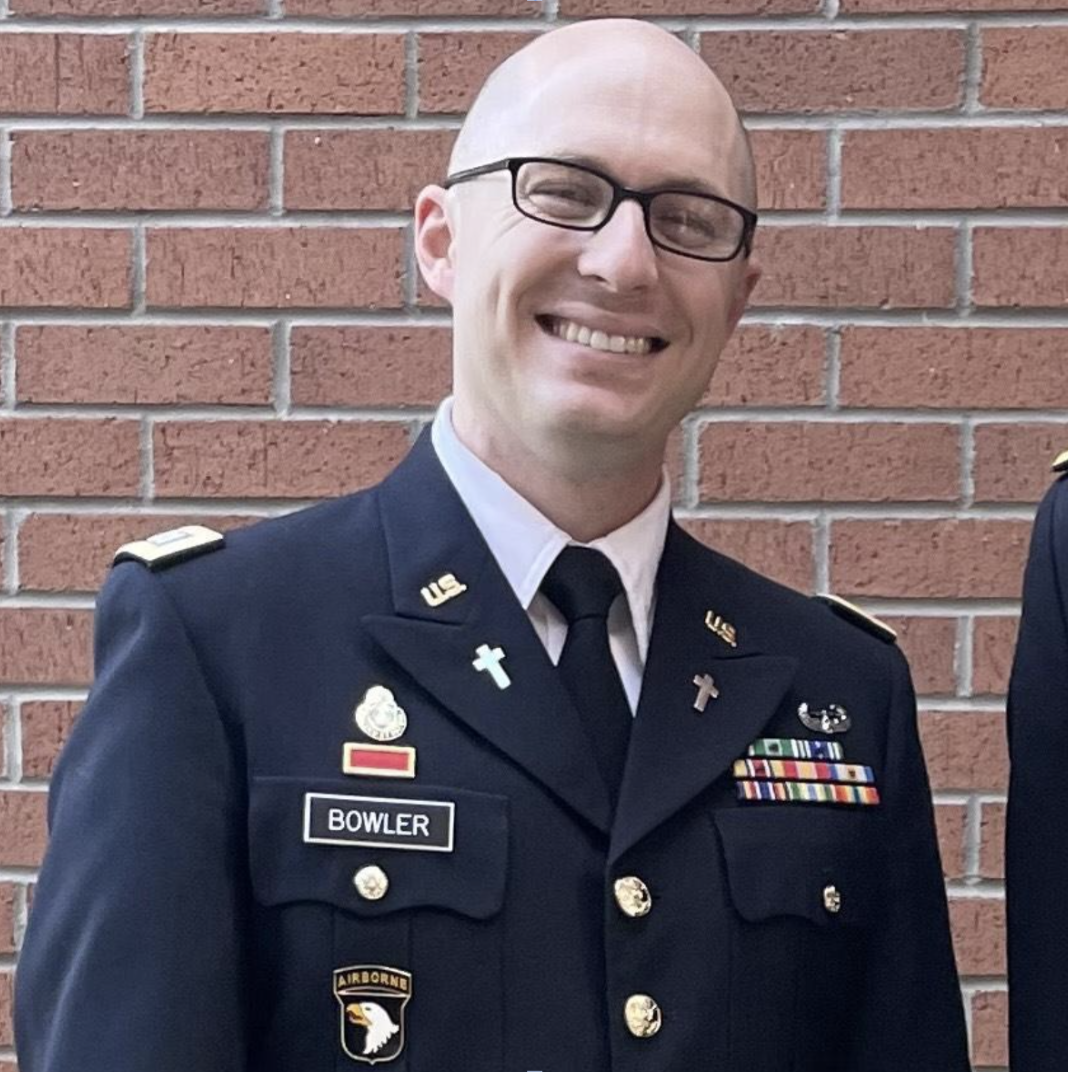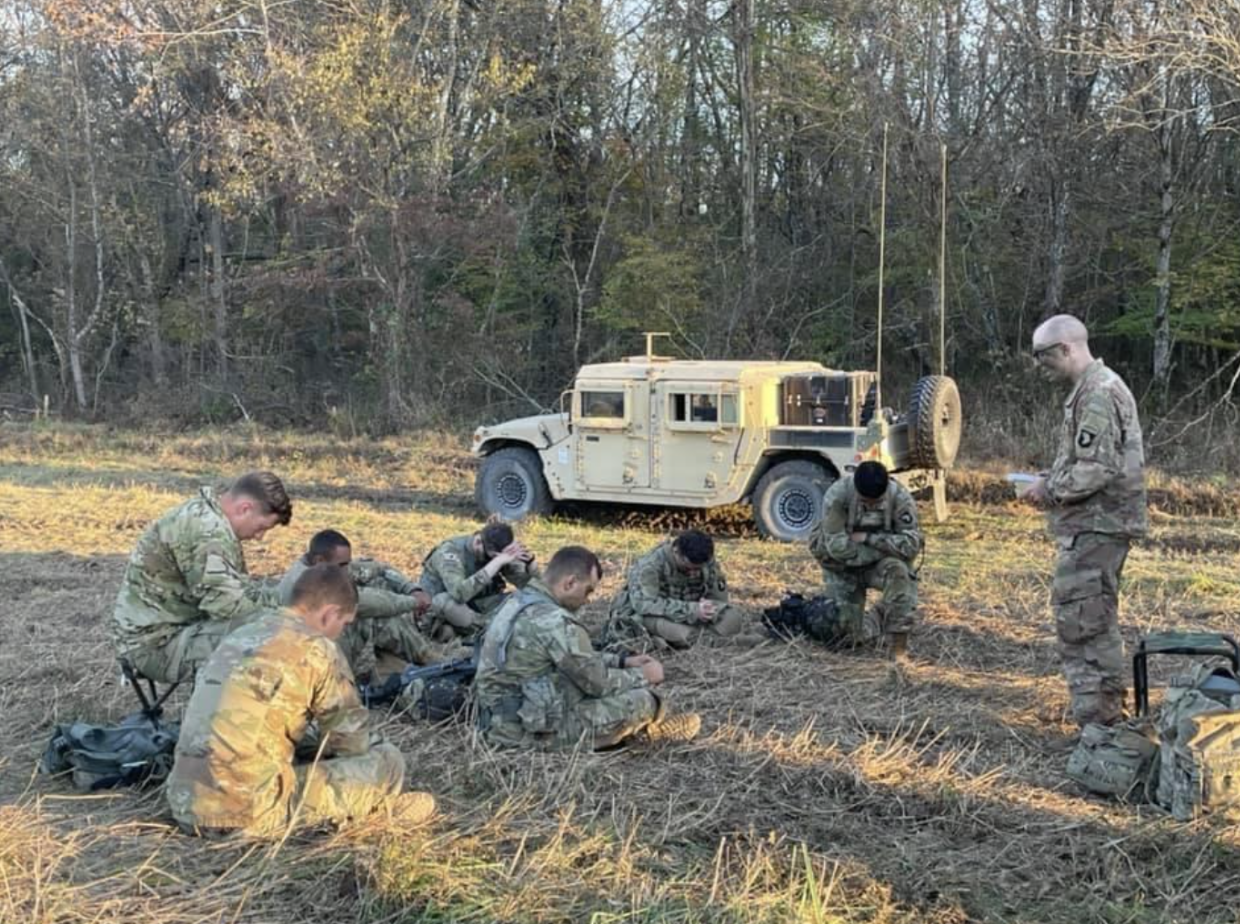ECS, BYU Prepare Military Chaplains Through Experience at Utah Hospitals
A groundbreaking partnership between Episcopal Community Services (ECS), its partner hospitals across the MountainStar Healthcare network, and Brigham Young University (BYU), is preparing students for military chaplaincy through a unique blend of academic rigor and intensive experiential learning.
"The [ECS] program exposed me to a myriad of environments and conditions that I would need to navigate throughout my ministry, but in a controlled, positive educational setting,”
Chaplain Austin Bowler, Captain
The Power of Clinical Pastoral Education (CPE)
This year marks the 40th Anniversary of the ACPE-accredited ECS Spiritual Care & Education Center at St. Mark’s Hospital, and its celebrated legacy of hundreds of chaplain graduates.
ECS and BYU formalized their partnership in clinical pastoral education (CPE) in 2019. Today, the ECS chaplain education program is a component of the BYU curriculum for students preparing for a career in chaplaincy, including in support of the armed services. ECS works with MountainStar Healthcare to provide valuable experience to future chaplains at hospitals from Logan to Payson.
Chaplain (Captain) Austin Bowler's training with ECS pre-dates the formalized relationship between ECS and BYU which began in 2019. Having already graduated from BYU, his journey to Army chaplaincy exemplifies the success of ECS’s approach as he refers to his clinical experience as an indispensable pathway to active-duty service.
"The [ECS] program exposed me to a myriad of environments and conditions that I would need to navigate throughout my ministry, but in a controlled, positive educational setting,” Chaplain Bowler said. “Some of these environments and conditions include how to hold space for interfaith dialogue, the do’s and dont’s of pluralistic ministry, experience with suffering, grief, trauma, and death, and how to care for my own soul in the aftermath of helping someone walk through one of their darkest days."
"CPE provides the opportunity for military-bound students to practice claiming their authority within a unique hierarchical setting," said ECS Certified Educator Rev. Andy Stubblefield. "They get to engage with an interdisciplinary [hospital] team and learn the value of their unique perspective. This is an invaluable experience that sets them up for the vast array of opportunities they will have in military chaplaincy."
Chaplain Bowler highlights the cyclical learning inherent in CPE: "The CPE process allows you to engage in ministry, reflect on what you did, and then reengage in the ministry. If a student is intentional, they can begin to learn how diverse spiritual care approaches are effective and simultaneously start to discern when an intervention might be ineffective or inappropriate in certain ministry contexts."
The BYU Master of Arts in Chaplaincy Establishes a Comprehensive Foundation
The ECS program’s robust curriculum complements BYU’s strong academic foundation. Dr. Lee Harms, Associate Graduate Coordinator for the BYU MA Program, highlights, "The Master of Arts in Chaplaincy at BYU is an academically rigorous, practice-based graduate program with emphases in military and healthcare chaplaincy."
As a retired Army Chaplain with a Doctor of Ministry, Dr. Harms knows first-hand the importance of preparing military-bound chaplains through experiential learning.
"The Clinical Pastoral Education (CPE) component of BYU’s Master of Arts in Chaplaincy offers students a rich experiential learning opportunity,” said Dr. Harms. “During the CPE experience, students provide spiritual care to patients and families while being part of an interfaith team of chaplains. Students receive valuable feedback on their spiritual care interactions while working under the guidance of a chaplain educator who is certified with the Association for Clinical Pastoral Education (ACPE). The training equips them with the practical skills and experience needed for future service in both healthcare and military chaplaincy."
Chaplain Bowler emphasized: "For me, what I learned the most was how to stay present with the patients–whatever they were feeling and whatever they were going through."
Chaplain Bowler’s Seamless Integration into Interdisciplinary Care
The established relationship between ECS and its partner hospitals across the MountainStar network ensures that chaplains are not merely visitors but integral members of the care team. “Student chaplains play an essential role in Women’s and Children’s Services, offering invaluable support to both nurses and families during challenging times," said Christina Wright, Director of Children’s Services at Timpanogos Regional Medical Center. “They provide compassionate guidance to our nurses and support families facing prolonged hospital stays.”
Chaplain Bowler recalls a powerful instance during his residency where his presence was vital.
"One instance that stands out among others was a code blue (or life-threatening emergency) involving a Labor and Delivery patient. That situation caused a lot of different professionals from the interdisciplinary team to flood into one room. When I arrived, I noticed the husband of the patient sitting in a chair near the door, visibly overwhelmed and emotional. I entered the room, took a knee beside him, grabbed his hand to help ground him, and did my best to be present and talk him through the situation."
Army Chaplain (Captain) Austin Bowler leading a worship service during a field training exercise.
Even amidst the urgency, Chaplain Bowler recalls how the importance of spiritual care was acknowledged. A nurse leader asked those not essential to care to leave the room, and many exited – but Chaplain Bowler remained. “Some of the doctors and nurses acknowledged that I was still there to care for the family as they tended to the woman and delivered the baby in an emergency procedure. Chaplain ministry and support in this critical moment was respected and viewed as an important and appreciated aspect of patient and family care."
Chaplain Bowler emphasizes that the depth of a student's engagement directly correlates with their growth. "When it comes to experiential learning in the CPE process, I believe that what a student will gain from the process is directly correlated to the amount of effort and energy they put into the process. True commitment and genuine work have the potential to yield spiritual maturing, refine one’s spiritual care practices, strengthen pastoral identity, and improve interpersonal skills."
"The CPE learning process helped prepare my heart, mind, and spirit for the ministry I engage within the U.S. Army,” said Chaplain Bowler. “The clinical time in a hospital is a sacred opportunity to be an intimate stranger to a vulnerable population with varying needs and beliefs."


